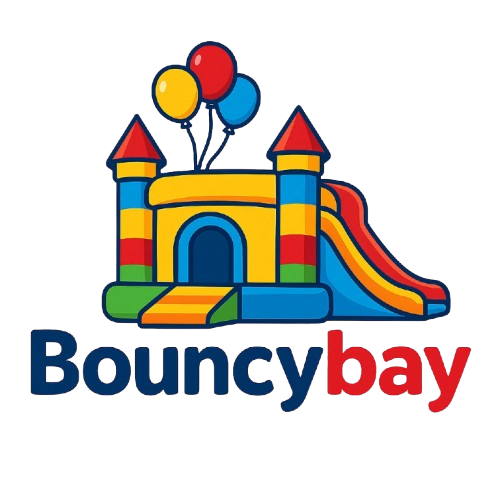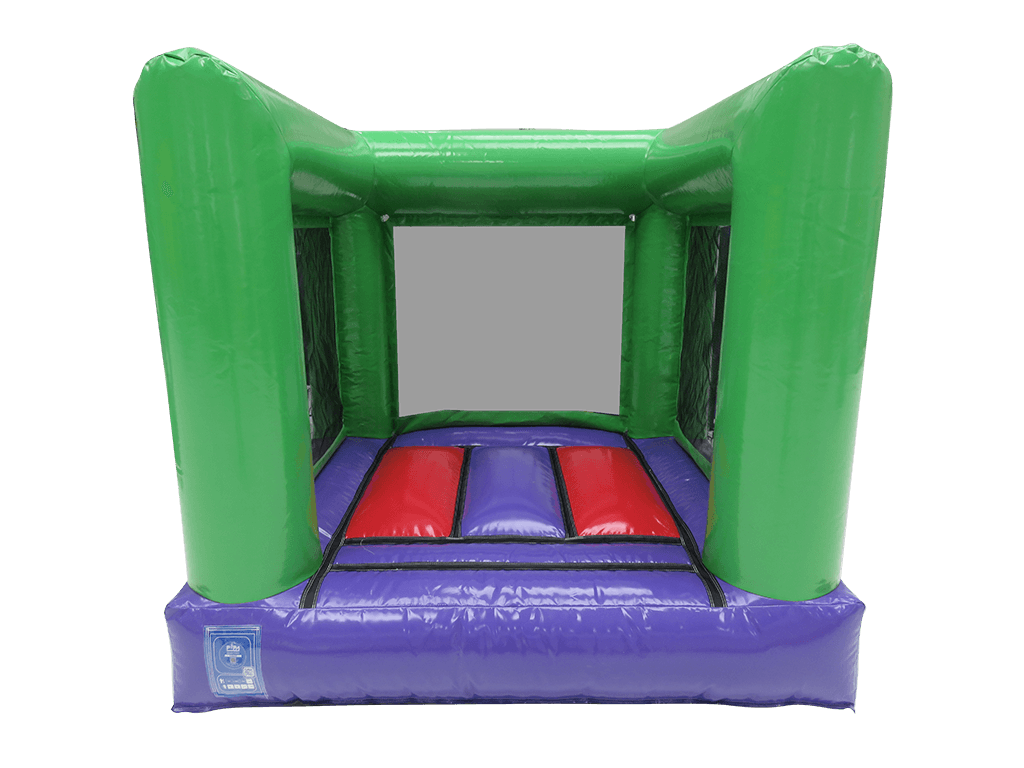Uncategorized
Guide to Bounce House Safety
Guide to Bounce House Safety. Bounce houses and inflatable slides transform ordinary gatherings into unforgettable adventures. But as a parent or event planner, you likely have questions about safety, setup, and choosing the right equipment. At BouncyBay.com, we’ve helped over 50,000 families worldwide create joyful memories safely. This guide consolidates our expertise into actionable advice—whether you’re renting or buying.
How to Clean a Bouncy House Properly
Prevent Mold, Bacteria, and Wear
Regular cleaning extends your inflatable’s lifespan and protects users. Here’s our proven method:
- Post-Use Wipe-Down: Use a soft cloth, mild soap (like dish detergent), and warm water. Focus on high-touch areas.
- Deep Cleaning (Quarterly): Inflate the unit, spray with a vinyl-safe cleaner (avoid bleach), and scrub gently with a soft-bristle brush.
- Drying: Crucially, let it air-dry completely before storage (6–8 hours minimum). Folded damp vinyl breeds mold.
Pro Tip: BouncyBay’s maintenance kits include UV protectant spray to prevent sun damage.
Source: CDC Guidelines for Cleaning Recreational Equipment
Bounce House Safety Rules for Kids | Guide to Bounce House Safety
Non-Negotiables for Injury Prevention
- Supervision: Always have 1 adult per 5 children.
- Age/Size Grouping: Never mix toddlers with older kids. Follow manufacturer weight limits (e.g., max 6 kids under 80 lbs each).
- No Shoes/Socks: Bare feet grip best.
- No Food/Drinks: Prevents choking and slips.
- Weather Rules: Shut down during >15 mph winds or rain (wet vinyl = slipping hazard).
Real Talk: 72% of bounce house injuries stem from collisions or falls over the sides. Proper anchoring (covered next) is critical.
Source: American Academy of Pediatrics – Playground Safety
How to Choose the Right Size Bounce House
Space, Capacity, and Usage Demystified
| Small Backyards | Large Events | |
|---|---|---|
| Dimensions | 10′ x 12′ | 15′ x 25’+ |
| Capacity | 3–5 kids | 8–12 kids |
| Best For | Birthdays, toddlers | Schools, festivals |
| Key Questions: |
- Measure First: Add 5 ft clearance on all sides.
- Storage Space: Will it fit in your garage?
- Blower Proximity: Keep within 25 ft of power.
Explore BouncyBay’s Space Calculator Tool for personalized recommendations.
Commercial vs Residential Bounce House Differences
Why Build Quality Matters
| Feature | Residential | Commercial |
|---|---|---|
| Material | 0.35mm PVC | 0.55mm+ Reinforced PVC |
| Stitching | Single-stitched seams | Double-stitched + webbing |
| Weight Limit | 250–500 lbs | 1,000–2,000 lbs |
| Lifespan | 2–4 years | 5–10 years |
Rule of Thumb: For >50 uses/year or public events, invest in commercial-grade units (like BouncyBay’s ProLine Series). Residential units suit occasional backyard use.
How to Anchor a Bounce House Safely in Wind
Stability Over Everything
- Stake Anchoring (Grass/Dirt): Use 18″ steel stakes at 45° angles through all anchor points.
- Sandbags (Concrete/Decks): 40-lb bags per anchor point.
- Never Use… Rocks, bricks, or cinder blocks (they shift and tear vinyl).
Wind Threshold: Deflate immediately if winds exceed 15 mph. Monitor via apps like Windy.com.
BouncyBay Tip: Our kits include commercial-grade stakes and ratchet straps.
Best Bounce House for Small Backyard
Space-Smart Picks
Top features to prioritize:
- Compact Designs: Oval/circle shapes (e.g., 10′ x 10′) maximize bounce area.
- Low Profile: Units under 8 ft tall avoid tree/wire hazards.
- Slide-Free Options: Slides add length—opt for bounce-only if space is tight.
Our Mini Bouncer fits patios under 12′ x 12′ and packs away in minutes.
Inflatable Slide Weight Capacity Guide
Match Limits to Your Group
| Slide Type | Max Weight | User Age |
|---|---|---|
| Toddler Slides | 100 lbs | 2–5 years |
| Standard Slides | 250 lbs | 5–12 years |
| Commercial Slides | 500+ lbs | Teens/adults |
Safety Note: Capacity ≠ simultaneous users. Limit slides to 1–2 riders at a time. Check labels for exact specs.
How to Patch a Small Hole in a Bouncy Castle
Quick Fixes That Last
DIY Repair Kit Essentials:
- Vinyl repair adhesive (e.g., Tear-Aid)
- Rubbing alcohol & sandpaper
- Scissors
Steps:
- Deflate and clean the area.
- Sand lightly around the hole.
- Cut patch 1″ larger than hole.
- Apply glue, press patch, weight it for 24 hrs.
Pro Tip: BouncyBay includes free patch kits with every purchase. Larger tears? Use our repair service.
What Size Blower Do I Need for My Bounce House?
CFM vs. PSI Explained
- CFM (Cubic Feet/Minute): Volume of air. Match to inflatable size:
- Small units: 600–800 CFM
- Combos/slides: 1,100–1,500 CFM
- PSI (Pressure): Keep airflow steady (0.4–0.8 PSI).
Warning: Undersized blowers cause sagging; oversized ones stress seams.
Recommendation: BouncyBay’s Blower Finder Quiz eliminates guesswork.
Bounce House Setup Instructions Step-by-Step
From Box to Bouncing in 20 Minutes
- Unpack on a flat, debris-free surface.
- Unfold, connect blower to inflation port (secure with tie-downs!).
- Anchor before full inflation.
- Test stability—push gently on walls.
- Add safety rules sign.
Download our visual setup checklist.
How to Store Inflatables Long Term
Avoid UV Damage, Rodents, and Moisture
- Clean & Dry: As noted earlier—non-negotiable.
- Fold Loosely: No tight creases. Use original bag or a breathable container.
- Storage Location: Cool, dry, dark place (not attics/garages >90°F).
- Rodent Proof: Add cedar blocks or peppermint oil sachets.
BouncyBay Storage Bags feature UV-resistant lining and moisture-wicking vents.
Benefits of Water Slides for Summer Parties
Beat the Heat Safely
- Physical Activity: 30 mins of sliding burns ~150 calories.
- Sensory Development: Water play boosts motor skills (per Early Childhood Journal).
- Heat Safety: Prevents overheating vs. dry bounce houses.
Parent Hack: Pair slides with splash pools for hours of engagement. See our summer combos.
Bounce House Rental vs Buying Comparison
When Each Makes Sense
| Scenario | Rent | Buy |
|---|---|---|
| Infrequent Use (<3x/year) | ✓ | |
| Large Events (100+ guests) | ✓ | |
| Regular Use (>5x/year) | ✓ | |
| Customization Needs | ✓ |
Cost Analysis: Buying pays off after 6–8 rentals. Use our Buy vs. Rent Calculator.
Are Inflatable Slides Safe for Toddlers?
Age-Appropriate Design Matters
Yes—with caveats:
- Choose slides under 4 ft tall with gentle slopes.
- Require direct adult spotting at the ladder and landing zone.
- Avoid combo units with older kids’ bounce areas.
Our Pick: BouncyBay’s Toddler Slide has 3″ padded walls and non-slip steps (tested for ages 18mo+).
Best Bounce House Themes for Birthday Parties
2024’s Top Picks
- Unicorn Fantasy: Pastel colors, horn toppers (ages 3–8).
- Dinosaur Adventure: Jurassic greens, “fossil” prints (ages 4–10).
- Sports Arena: Hoops, goals, turf print (ages 5–12).
- Superhero HQ: Cityscape walls, emblem cutouts (ages 4–9).
Theme Tip: Match cake/decor for Instagram-worthy moments! Browse theme ideas.
How Much Space Do I Need for a Combo Unit?
Layouts for Safety and Flow
- Minimum Clearance: Combo units require 20′ x 20′ area (e.g., 13′ x 15′ slide + bounce area).
- Buffer Zones: 5 ft around sides, 15 ft in front of slide exit.
- Slope Consideration: Slides need 6–8 ft of downward run.
Space Saver: Our SpaceSaver Combo fits 15′ x 15′ yards.
Conclusion: Safety, Joy, and Lasting Memories
Choosing and maintaining bounce equipment shouldn’t feel overwhelming. By following these evidence-based practices—from anchoring in wind to age-appropriate selections—you create a foundation for fun without compromise. At BouncyBay.com, we engineer joy with American Society for Testing and Materials (ASTM)-certified materials and transparent guidance. Because your child’s laughter deserves the safest stage. Guide to Bounce House Safety
Ready to elevate playtime?
👉 Explore Our Safety-Certified Collection
👉 Download Our Free Safety Checklist

